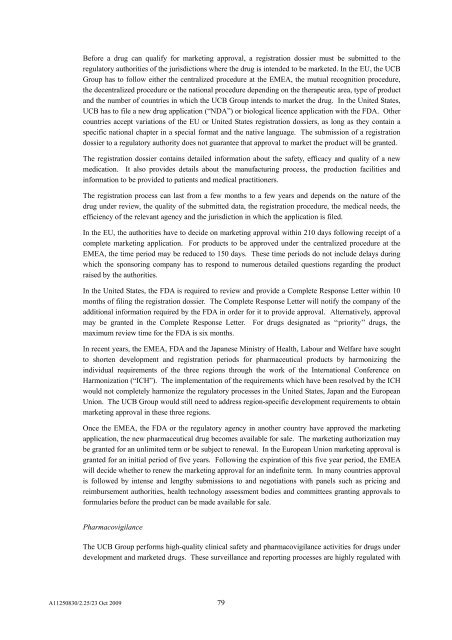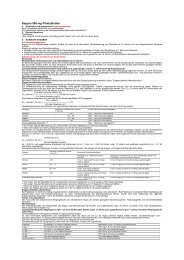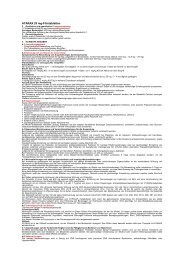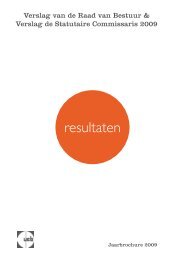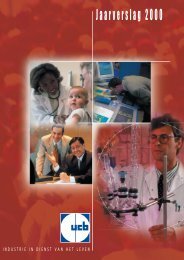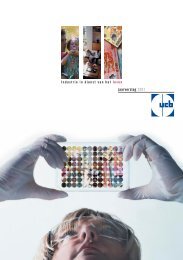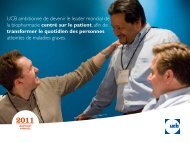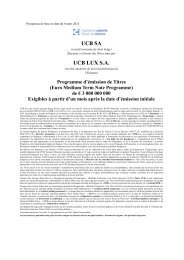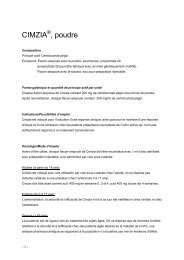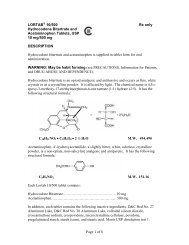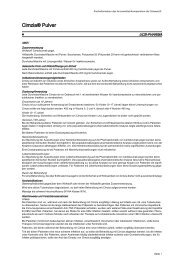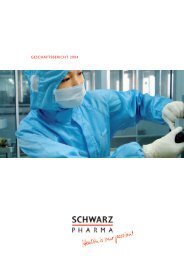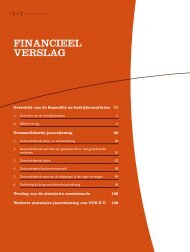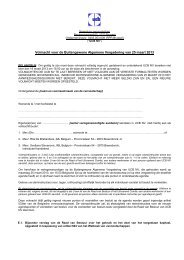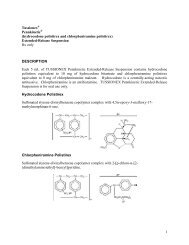UCB SA - BNP Paribas Fortis
UCB SA - BNP Paribas Fortis
UCB SA - BNP Paribas Fortis
Create successful ePaper yourself
Turn your PDF publications into a flip-book with our unique Google optimized e-Paper software.
Before a drug can qualify for marketing approval, a registration dossier must be submitted to the<br />
regulatory authorities of the jurisdictions where the drug is intended to be marketed. In the EU, the <strong>UCB</strong><br />
Group has to follow either the centralized procedure at the EMEA, the mutual recognition procedure,<br />
the decentralized procedure or the national procedure depending on the therapeutic area, type of product<br />
and the number of countries in which the <strong>UCB</strong> Group intends to market the drug. In the United States,<br />
<strong>UCB</strong> has to file a new drug application (“NDA”) or biological licence application with the FDA. Other<br />
countries accept variations of the EU or United States registration dossiers, as long as they contain a<br />
specific national chapter in a special format and the native language. The submission of a registration<br />
dossier to a regulatory authority does not guarantee that approval to market the product will be granted.<br />
The registration dossier contains detailed information about the safety, efficacy and quality of a new<br />
medication. It also provides details about the manufacturing process, the production facilities and<br />
information to be provided to patients and medical practitioners.<br />
The registration process can last from a few months to a few years and depends on the nature of the<br />
drug under review, the quality of the submitted data, the registration procedure, the medical needs, the<br />
efficiency of the relevant agency and the jurisdiction in which the application is filed.<br />
In the EU, the authorities have to decide on marketing approval within 210 days following receipt of a<br />
complete marketing application. For products to be approved under the centralized procedure at the<br />
EMEA, the time period may be reduced to 150 days. These time periods do not include delays during<br />
which the sponsoring company has to respond to numerous detailed questions regarding the product<br />
raised by the authorities.<br />
In the United States, the FDA is required to review and provide a Complete Response Letter within 10<br />
months of filing the registration dossier. The Complete Response Letter will notify the company of the<br />
additional information required by the FDA in order for it to provide approval. Alternatively, approval<br />
may be granted in the Complete Response Letter. For drugs designated as ‘‘priority’’ drugs, the<br />
maximum review time for the FDA is six months.<br />
In recent years, the EMEA, FDA and the Japanese Ministry of Health, Labour and Welfare have sought<br />
to shorten development and registration periods for pharmaceutical products by harmonizing the<br />
individual requirements of the three regions through the work of the International Conference on<br />
Harmonization (“ICH”). The implementation of the requirements which have been resolved by the ICH<br />
would not completely harmonize the regulatory processes in the United States, Japan and the European<br />
Union. The <strong>UCB</strong> Group would still need to address region-specific development requirements to obtain<br />
marketing approval in these three regions.<br />
Once the EMEA, the FDA or the regulatory agency in another country have approved the marketing<br />
application, the new pharmaceutical drug becomes available for sale. The marketing authorization may<br />
be granted for an unlimited term or be subject to renewal. In the European Union marketing approval is<br />
granted for an initial period of five years. Following the expiration of this five year period, the EMEA<br />
will decide whether to renew the marketing approval for an indefinite term. In many countries approval<br />
is followed by intense and lengthy submissions to and negotiations with panels such as pricing and<br />
reimbursement authorities, health technology assessment bodies and committees granting approvals to<br />
formularies before the product can be made available for sale.<br />
Pharmacovigilance<br />
The <strong>UCB</strong> Group performs high-quality clinical safety and pharmacovigilance activities for drugs under<br />
development and marketed drugs. These surveillance and reporting processes are highly regulated with<br />
A11250830/2.25/23 Oct 2009 79


